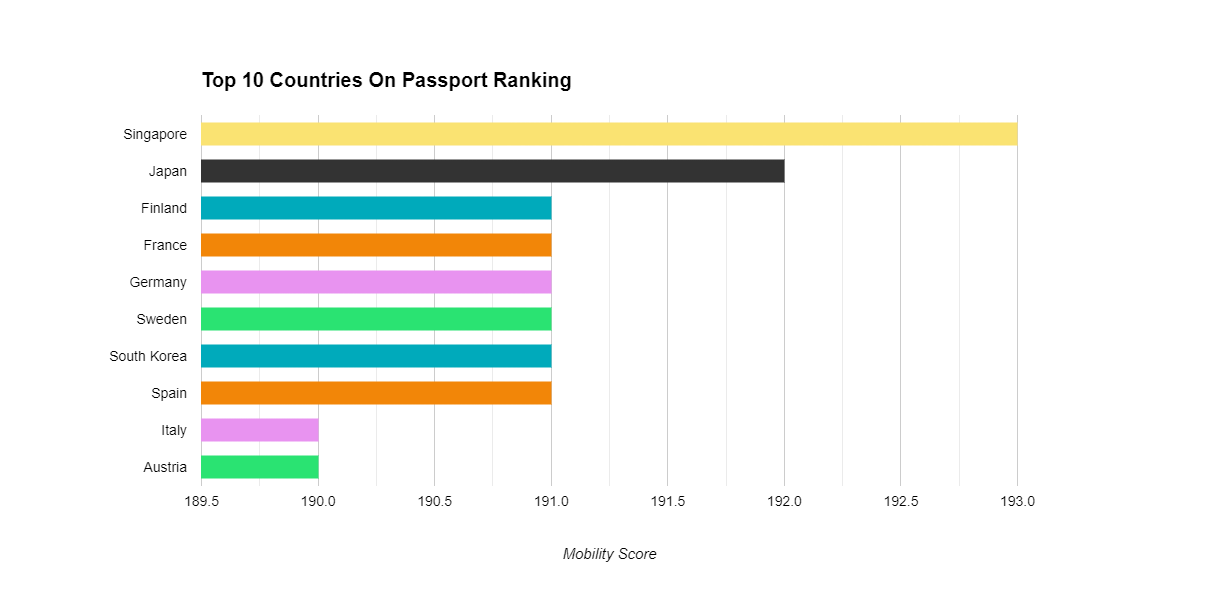The Passport Index is an interactive measure that provides insights about passports, including the option to compare and analyse the world’s passports. The grade is based on the freedom of movement and visa-free travel afforded to holders of particular passports.
The Henley Passport Index is an interactive and real-time evaluation of passports across the globe by their total mobility score. The ranking is based on visa-free travel choices and how welcoming the countries are to visiting foreigners.

Top 10 Countries On Passport Ranking
Here are the top 10 countries on passport classification in 2023 according to numerous sources:
- Singapore – with a visa-free/visa-on-arrival score of 193
- Japan – with a visa-free/visa-on-arrival score of 192
- Germany, Sweden, Finland, Spain, France, South Korea – with a combined mobility score of 191
- Italy, Austria, Denmark, Luxembourg, Netherlands, United Kingdom – with a mobility score of 190
- Ireland, Belgium, Malta, Norway, Portugal – with a visa-free/visa-on-arrival score of 189
- Australia, New Zealand, Switzerland – with a visa-free/visa-on-arrival score of 188
- Canada, Czechia, Greece, Poland, United States – with a visa-free/visa-on-arrival score of 187
- Hungary – with a visa-free/visa-on-arrival score of 186
- Lithuania – with a visa-free/visa-on-arrival score of 185
- 1Estonia, Latvia, Slovakia, Slovenia – with a visa-free/visa-on-arrival score of 184
It is vital to remember that the rankings may fluctuate based on the source and the criteria applied for the assessment. Passport ranking is an important criterion for visitors as it limits the number of countries they can visit without a prior visa.
| Country | Rank | Access |
|---|---|---|
| Singapore | 1 | 193 |
| Japan | 2 | 192 |
| Finland | 3 | 191 |
| France | 3 | 191 |
| Germany | 3 | 191 |
| South Korea | 3 | 191 |
| Spain | 3 | 191 |
| Sweden | 3 | 191 |
| Italy | 3 | 190 |
| Austria | 4 | 190 |
| Denmark | 4 | 190 |
| Luxembourg | 4 | 190 |
| Netherlands | 4 | 190 |
| United Kingdom | 4 | 190 |
| Ireland | 4 | 189 |
| Belgium | 5 | 189 |
| Malta | 5 | 189 |
| Norway | 5 | 189 |
| Portugal | 5 | 189 |
| Australia | 6 | 188 |
| New Zealand | 6 | 188 |
| Switzerland | 6 | 188 |
| Canada | 7 | 187 |
| Czechia | 7 | 187 |
| Greece | 7 | 187 |
| Poland | 7 | 187 |
| United States | 7 | 187 |
| Hungary | 8 | 186 |
| Lithuania | 9 | 185 |
| Estonia | 10 | 184 |
| Latvia | 10 | 184 |
| Slovakia | 10 | 184 |
| Slovenia | 10 | 184 |
The Henley Passport Index Ranks 2024
The Henley Passport Index Ranks 2024 assesses passports across the globe by their total mobility score. The most robust passport in the world in 2024 is Singapore, with a visa-free/visa-on-arrival score of 193. Japan is tied for second spot, with a visa-free/visa-on-arrival score of 192. The Afghan passport is the lowest-ranking entry in the Henley Passport Index, giving visa-free travel to only 27 countries. Citizens of the lowest-ranking countries, including Iraq, Syria, and Pakistan, are being cut out of various chances for economic mobility and growth.
Indian Passport Ranking
The passport of India is ranked 83 in the world by the 2024 Passport Index, with persons allowed to visit 73 countries visa-free. The rankings are decided by the mobility score of the countries which is calculated on provisions including visa-free visit, visa on arrival, an eVisa (if used within three days) and electronic travel permission.
Also Read
FAQs (Frequently Asked Questions)
Q1. What is a passport ranking?
Answer: A passport ranking is a measure of a country’s passport strength, indicating the number of countries its citizens can visit without requiring a visa or with visa-free access.
Q2. Which countries typically have the most powerful passports?
Answer: Generally, countries with strong economies and stable diplomatic relationships tend to have the most powerful passports. As of recent updates, Singapore, Japan, and Germany ranked at the top.
Q3. How often do passport rankings change, and what factors influence these changes?
Answer: Passport rankings can change regularly, typically on an annual or quarterly basis. Several factors influence these changes, including diplomatic relations, visa policy changes, and international agreements.
